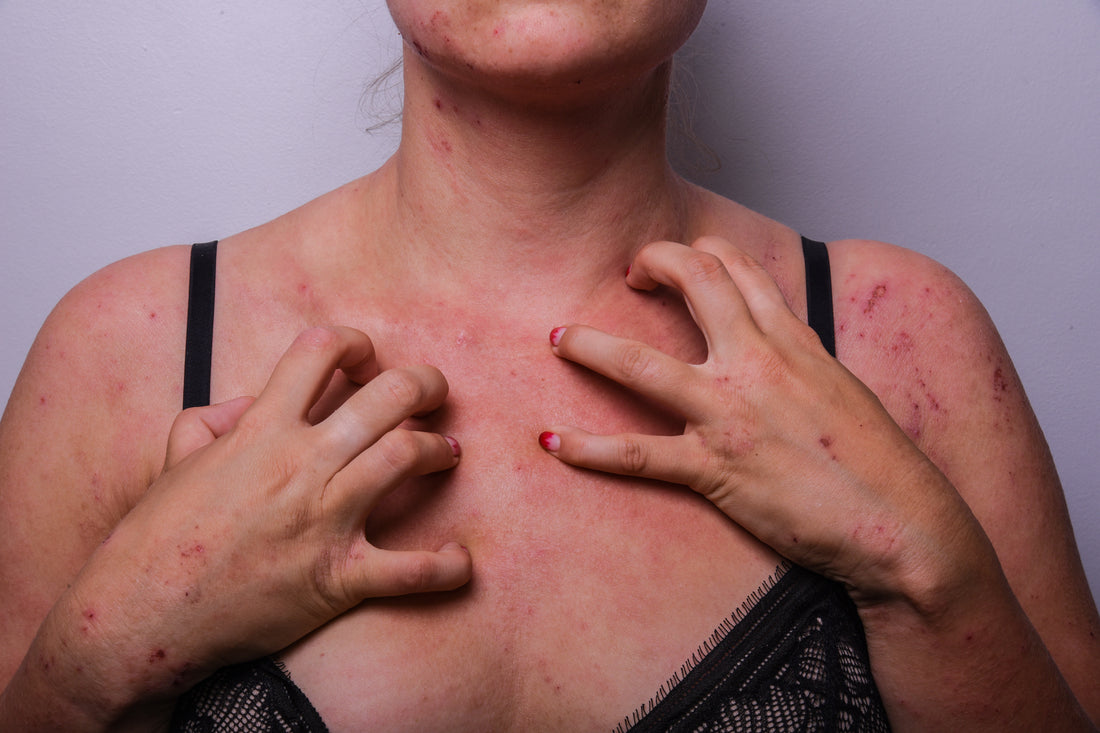
The Derms guide to eczema
Living with the discomfort of eczema can be frustrating to say the least. More than just dry skin, sufferers have to contend with the trials of flare-ups, flakiness and itching on the daily but there are simple steps you can take that make a big difference. We talk to Professor Nicola Ralph, Dermatologist at Institute of Dermatologists, Ireland (instituteofdermatologists.ie) about how to manage the common skin condition...
What is eczema?
‘Eczema is a common chronic inflammatory skin condition that causes red, itchy, and inflamed skin,’ explains Nicola. ‘Eczema is often linked to allergies and affects approximately 20% of Irish children and up to 10% of Irish adults.’ Eczema comes from the Greek meaning 'to boil,' and it's used to describe itchy, red, and inflamed skin. The word is often used interchangeably with Atopic Dermatitis, where ‘atopic’ refers to an allergy or hypersensitive reaction and ‘dermatitis’ means inflammation of the skin. Eczema and dermatitis are umbrella terms used to describe a number of conditions that cause the skin to become inflamed or irritated.
Causes
Genetics: Some inflammatory skin conditions, such as eczema have a genetic component, which means that people with a family history of these conditions are more likely to develop them.
Age: Eczema is most common in children affecting 1 in 5 Irish children.
Immune system dysfunction: Many inflammatory skin conditions are caused by an overactive immune system, which can be triggered by various factors.
Environmental factors: Exposure to certain environmental triggers, such as allergens or irritants, can increase the risk of developing an inflammatory skin condition.
Lifestyle factors: Stress can trigger or exacerbate eczema. Maintaining a healthy lifestyle, including stress management techniques, may help reduce the risk of developing inflammatory skin conditions and also improve the condition.
How to manage eczema
Identify triggers: Identify and avoid triggers that may exacerbate your eczema. Common triggers include certain fabrics, harsh soaps or detergents, extreme temperatures, stress. Eczema can flare up in the wintertime and be extremely uncomfortable and itchy. In the winter, cold air and central heating can work together to dry out the skin, and the skin of those suffering from eczema can struggle to maintain moisture, as their skin barrier is compromised. Warm clothes and scratchy fabrics (like wool) can all do their bit to have the eczema-prone miserable in the winter. Keeping a journal to track your flare-ups and potential triggers can be helpful.
Keep the skin moisturised: Apply a fragrance-free, hypoallergenic moisturizer to the skin several times a day to help keep it hydrated and prevent dryness.
Use gentle skin care products: Use fragrance-free, hypoallergenic skin care products to avoid irritating the skin.
Avoid scratching: It’s crucial to resist the urge to scratch, as it can further irritate the skin and worsen flare-ups.
Take short lukewarm showers/baths rather than long hot ones to prevent further dryness of the skin and keep the bedroom temperature low to prevent scratching during the night.
Follow a healthy lifestyle: Encourage the person to follow a healthy lifestyle, including regular exercise, a balanced diet, and stress management, which can help to reduce inflammation and improve overall health.
Seek medical treatment: If the person's symptoms are severe or do not improve with self-care measures, encourage them to seek medical treatment from a healthcare professional. Treatment may include prescription topical or oral medications, light therapy, or other therapies which work by suppressing the immune system including oral therapies and new biologic therapies.
Maintain a comfortable environment: Keep the temperature and humidity levels in your home stable and comfortable. Use a humidifier during dry seasons to prevent your skin from drying out.
What is the difference between Atopic Eczema and seborrheic eczema?
Atopic dermatitis (AD), also known as atopic eczema, and seborrheic dermatitis (SD), also known as seborrheic eczema, are two distinct types of dermatitis with different causes, symptoms, and treatments.
Atopic dermatitis is a chronic inflammatory skin condition that often runs in families with a history of allergies or asthma. It typically appears as dry, itchy patches of skin that can become red, swollen, and cracked. It is usually diagnosed based on a patient's medical history, physical examination, and symptoms.
Seborrheic dermatitis, on the other hand, is a common skin condition that affects the scalp, face, and other oily areas of the body (central chest/upper back). It is caused by an overgrowth of yeast on the skin (malasezzia furfur) and is often associated with oily skin, stress, and hormonal changes. Symptoms include red, scaly patches of skin that may be itchy. Diagnosis is usually based on a patient's medical history and physical examination, as the symptoms are often distinctive and can be recognized by your doctor. The scale can sometimes be more yellow and have a greasy feel to it.
If you suspect you have eczema or are suffering with severe eczema, make sure that you are being seen by your doctor, whether that be your GP or a dermatologist to get the best medical advice. For more information, please contact instituteofdermatologists.ie
